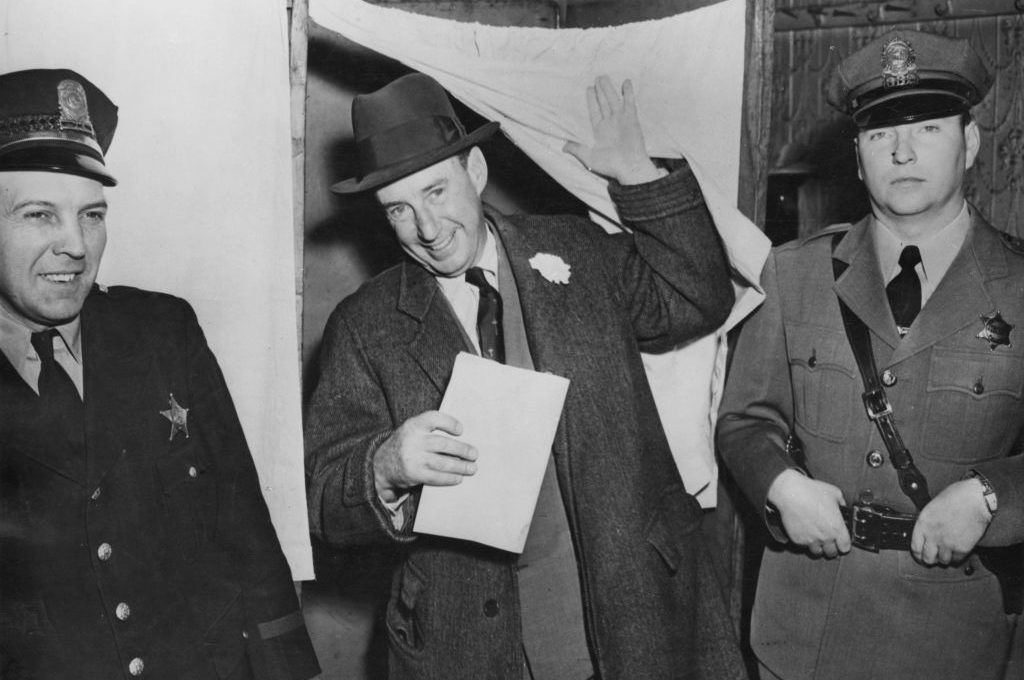An incident recalled from the days when I still counted out my age in coffee spoons has to do with a political conversation between my parents and two elderly Bostonian spinsters in the days when Republicans, even those of the female persuasion, were not unheard of in the Commonwealth of Massachusetts. The subject was the second Eisenhower-Stevenson set-to, which from the perspective of the 21st century looks as reserved as a difference of opinion between two members of the New York Yacht Club over a bottle of Evian and cigars. In those days my parents were still-recovering members of the FORWARD WITH ROOSEVELT set, and therefore MADLY FOR ADLAI in the campaigns of 1952 and 1956. Everyone (excepting myself and my sister) at this late-afternoon tea party was drinking dry sherry, and tempers were beginning to warm as the thin Green Mountain atmosphere of southern Vermont cooled.
‘Stevenson?’ one of the ladies exclaimed. ‘Who would vote for him?’
‘After all, Margaret,’ her more tactful companion put in gently, ‘he is on the ballot, you know.’
Statistics and human nature make it probable that in a two-party system the respective presidential candidates will split the vote more or less evenly between them, including in the instance of a misnamed landslide victory. Thus it is possible to infer too much about the shared political views of roughly one-half of the voters from the electoral tallies following a general election. Still, it is reasonable to assume that, while the 50 percent of voters in last year’s election who marked their ballots for Joe Biden are likely not all committed liberals themselves, nevertheless they are acquiescent and complicit in the policies of the Democratic candidate — further, that the Democrats might have something like a mental grasp on them.
The world is very different today from what it was in 1956, and the Democratic party is more changed still. Indeed, to say even that much is a gross understatement regarding an entity that began the 20th century as the voice of free-market liberalism and by the end of the second decade of the 21st had become the party of lunatics and the promoter of mass lunacy. People of a sanguine disposition will reflect that, after all, there are worse things than lunacy — for instance, realism. Realists will consider the possibility that half the country is now dangerously insane. Among the better reasons to suppose them right are that, according to current statistics, 47.4 percent of adult Americans hold college degrees or advanced ones, and that for the past generation or two a college diploma has been the mark of the Beast.
Until about the middle of the last century, American liberalism was a developed and coherent intellectual structure that, so far from being irrational, was unreasonably and unrealistically rationalist in its understanding of history, of the nature of politics and of human nature. Since then, the radical decline in American educational standards, accompanied by academia’s corruption at every level by the teachers’ unions and vulgar Marxism, have destroyed that structure entirely and replaced it with a form of intellectual progressivism having one foot planted in the groves of academe and the other in the slums.
Neo-Marxist politics are irrational, ill-informed, untethered from fact and reality, anti-historical, anti-intellectual and irresponsible. Worst of all, they are inherently and incurably frivolous, a matter of fashion responsive solely to whatever — and whoever — is fashionable at the moment. Progressive politics in substance is a mere social bauble, like the latest fashion in blue jeans and facial jewelry. For American progressives, the New York Times and the Washington Post are the political equivalents of Vogue and Women’s Wear Daily.
Fashion reflects social class, social class determines social status, and status — which is everything in America today — develops and sustains class consciousness. Progressives claim to abhor the concept of class, yet no group in this country (as in the rest of the western world) is as conscious of it as they are. T.S. Eliot observed in the 1930s that elite education had become the ambitious commoner’s upward path to untitled aristocracy in the shiny new meritocratic world of specialized knowledge and technocracy. Members of the New Class have always viewed themselves as natural aristocrats who by rights should be the governing directors of the world. The history of the past half-century is largely the effort of such people to claim what they see as their own, while distinguishing and separating themselves from the vulgar, ignorant and stupid masses from whom many of them actually arose. Their aristocratic pretensions, of course, are laughable.
The nouvelle clérisie, who are hardly the 21st-century equivalent of the Lumières of the 18th, are even less the equals of the old aristocracy, which was — above all — a confident class. The new pseudo-aristocracy has fanatical moral and intellectual self-confidence but is pathetically insecure socially — and true aristocrats are, above all, supremely self-confident in everything. That is the reason why the old aristocracy has always been notably rich in eccentrics, unlike the new conformist and politically correct one which, never daring eccentricity, produces only freaks, many of whom are celebrated for their freakishness and spend most of their lives showing it off on television shows and the social media.
After Trump voters and what it calls ‘populists’, the progressive aristocracy fears above all stepping out of line, except to race ahead of itself in the pursuit of influence, privilege and further material spoils, and to overtake the heroic outrider of the moment by some new and startling extremity of wokeness. Coming out of nowhere, the new people lack fixed principles, firm beliefs, a code of behavior and a sense of history, as well as any knowledge of the past. The old aristocrats displayed their military honors; the new ones wear their academic credentials ostentatiously across their weak and undeveloped chests. Their rewards are a fancy job, a big salary and the approval and applause of their shabby cohort, so long as they do not diverge in the slightest degree from progressive orthodoxy. In their own minds they are heroic guerrillas come down from the mountains in the disguise of statesmen and CEOs to sack the capital cities of oppression, superstition, prejudice, privilege and corruption, and replace them with the one Shining City. In reality they are the Children of Darkness assaulting the Children of Light under the banner of Cthulhu and Dagon.
This article was originally published in The Spectator’s June 2021 World edition.


















